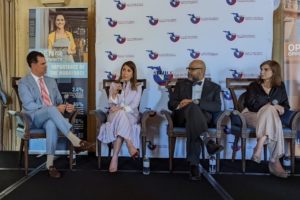
This op-ed originally appeared in the San José Spotlight on June 13, 2022. Read the full story.
The author, Alex Johnson, is the CEO of Pretzel Power, Inc., which owns five Auntie Anne’s Pretzels and five Cinnabon restaurants in the South and East Bay. He resides in Menlo Park.
It’s hard to overestimate the tremendous positive impact local franchise businesses have in California and our quality of life.
Across the Golden State, franchise businesses employ more than 728,000 residents, pay out more than $28.8 billion in wages and generate $69.4 billion in economic output. But for franchisees and the people they employ, these numbers aren’t just abstract facts and figures. They are the embodiment of a community bound by a common goal: to make a difference in peoples’ lives and provide meaningful jobs to those looking for greater opportunities.
This is something my family knows all too well. In 1994, my parents opened their first Auntie Anne’s Pretzel shop in the Great Mall in Milpitas. While time passed and trends changed, their business remained constant. Eventually, we decided to expand the business and opened another four Auntie Anne’s stores and five Cinnabon shops in malls across the South and East Bay.
While I initially saw myself having a legal career in the hopes of serving my community, I soon realized I didn’t have to go to law school to make a difference in the lives of others. I could better the lives of my fellow Californians by joining the family business.
Our local franchises employ more than 140 Californians, helping over 100 families put food on their tables, pay their bills and send their kids to college. But it doesn’t end there. Overall, franchise workers earn higher wages than non-franchised workers, and many more have access to health insurance, vacation time and sick leave through their employer.
Franchise businesses do more than generate jobs and send paychecks, too. The franchise business model ensures that when entrepreneurs choose to open a franchise, they don’t have to travel that road alone. Companies provide their franchisees with all sorts of tools, resources and guidance, helping to break down barriers to business ownership and pave the path to success, while at the same time allowing franchisees to independently own and have control over their business and their employees.
The tools and resources provided proved invaluable for my family as we worked to stand up our restaurants. In the more than 28 years that my family has been in the business, we’ve encountered numerous challenges—from economic downturns to the recent public health emergency that dried up the economy and made it more difficult to find workers. And each time, we knew we could lean on the franchise business model to help us find a solution and come out stronger on the other side.
I know that the support system created by the franchise business model has helped countless other entrepreneurs and families find success, too. While only 19% of small businesses are owned by minorities, 26% of franchise small business owners come from diverse backgrounds, according to the International Franchise Association. In fact, a third of all franchise owners say they wouldn’t be local business owners without the franchise model, which is particularly effective in opening doors for underserved and underrepresented communities.
As a proud member of the LGBTQ community, I can attest to the opportunities provided to people from all walks of life. And the franchise model empowers me to prioritize diversity and equity among staff and everyone we serve.
When people think of local franchises, quick service restaurants like the Auntie Anne’s or Cinnabon stores that I own and operate likely spring to mind. But franchises are also more than restaurants. They are retail shops, personal service providers, gyms, salons and much more.
The International Franchise Association’s Open for Opportunity Roadshow is coming to town this week where elected officials, local business owners like myself and community leaders will convene to discuss the state of the franchise economy and how we can work together to strengthen it. Because if there is one thing I have learned as a local business owner, it’s that we must protect the franchise model so that it can continue to provide extraordinary opportunities to people from all walks of life.



